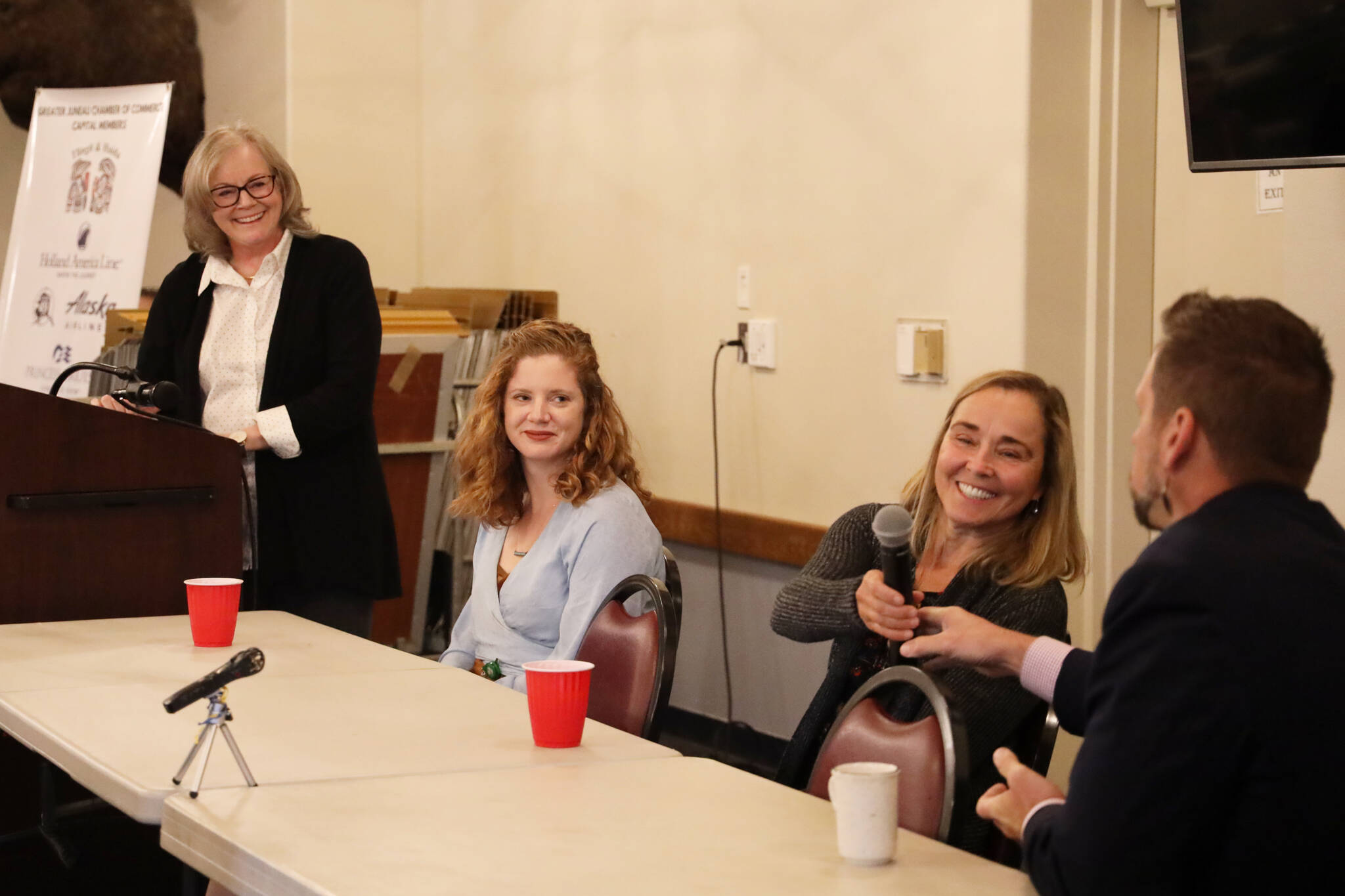Just over a month has passed since the rainy, treacherous and first-ever Ironman Alaska took place in the capital city. Now, officials are taking a look at the good, the bad and the future of the event as time ticks closer to 2023 competition.
Liz Perry, president and CEO, of Travel Juneau and a panel featuring Ironman Alaska participants and involved organization members met at Juneau Moose Family Center on Thursday afternoon to share a recap of the race to a full crowd of members of the Greater Juneau Chamber of Commerce who joined in at the luncheon. Perry led the discussion and spoke about this year’s race and what the future of Ironman of Alaska could look like — which could include an extension of the race’s contract — in Juneau after the capital city successfully has the first race under its belt.
Perry said in the coming weeks, the Ironman group, Travel Juneau and other participating organizations will meet to discuss how this year’s race went, and start planning the logistics for the second Ironman Alaska set to take place on Aug. 6, 2023.
The luncheon’s panel included the head coach of the High Cadence Triathlon team, Jamie Bursell, City and Borough of Juneau’s Finance Director Jeff Rogers, and SouthEast Alaska Regional Health Consortium project manager Sierra Gadaire.
Bursell — who is also a five-time Ironman finisher and whose Ironman Alaska time qualified her for the VinFast Ironman World Championship — said she was “amazed” at the “overwhelming” amount of support she and other racers received before, during and after the race, and said the energy in Juneau was “incredible.”
“None of us could believe it,” she said. “It was phenomenal the amount of support from the community — it felt like the Tour de France.”
She said anecdotally she has heard a lot of positive feedback about the race and its course from speaking with local and traveling athletes and said she thinks the course will likely stay the same, or very similar. She said out of the Ironman races she has participated in, she would rate the Juneau course as the “top course” that she’s ever done.
Perry said the community support also reverberated into the number of volunteer positions that the race was able to fill and said the local participation to help out with the race was “incredible.” She said out of the about 1,500 volunteer positions filled to aid with the day-long event, around 90% were filled by locals and said many people traveled to Juneau just to volunteer.
“Some volunteers just came for the spectacle of the event,” she said.
Gadaire said as a main sponsor of the event, SEARHC found “a lot of success” in working with the Ironman group as a sponsor and also to provide local medical professionals to assist throughout race day.
“Everyone was involved for athletes’ health and residents’ health,” she said. “As a locally hosted tribal health organization, we were happy to be involved in so many ways.”
Gadaire said it was also a “blast” to be the main sponsor of the IronKids race event, which officials said was the one of the most attended Ironkids events ever and included about 360 kids who registered to join in on the fun.
Rogers, who is also an Ironman Alaska finisher, said it’s hard to pinpoint the exact economic impact of the event, but said $7-8 million can be associated with the amount of out-of-town visitors that came to Juneau during that weekend.
“The short answer is I don’t know, I would have just been guessing, ” he said. “We’re not a normal baseline, but certainly many businesses benefited.”
Rogers also said it should be noted that given the high cost to sign up and own the proper equipment for a race of this magnitude, most racers tend to be higher income and likely came to Juneau with “the ability to spend.”
Perry in agreement said it’s hard to say for certain how much economic value the race had at this time, but said those who came to participate or witness the race “spent a tremendous amount of money while they were in town.”
“The economic ripple effect absolutely was felt regionally and even statewide,” Perry said.
Looking to the future of Ironman Alaska — which Juneau has three-year contract with — Perry and the panel were in agreement that Juneau could be a “ripe venue” for the future of more Ironman Alaska races beyond the current contract, and could also potentially be a great place to open its doors to other large outdoor sporting events.
“Ironman doesn’t have to just leave, we can look beyond the three-year contract,” Bursell said.
“Last year sold out in record time, if we keep this kind of momentum, they could keep it going longer.”
Though the decision is ultimately up the the Ironman group to decide if it will choose to extend the contract, Bursell said continuing to show support for the race is a way to keep the idea on its radar.
“We had a great inaugural IRONMAN Alaska triathlon event where the community support was outstanding. We love to stay within communities where it is working for both the community and the brand. We have some longstanding relationships with communities with the likes of Madison, Wisconsin; Coeur d’Alene, Idaho; Lake Placid, New York and we can see Juneau being added to this list,” said an Ironman spokesperson in a statement shared with the Empire.
A long-term arrangement is something members of the panel expressed support for.
“I think it’s a great thing for the community and I think we should keep it going,” Gadaire said. “It was rejuvenating for the medical community — we can’t wait for next year.”
• Contact reporter Clarise Larson at clarise.larson@juneauempire.com or (651)-528-1807. Follow her on Twitter at @clariselarson.

